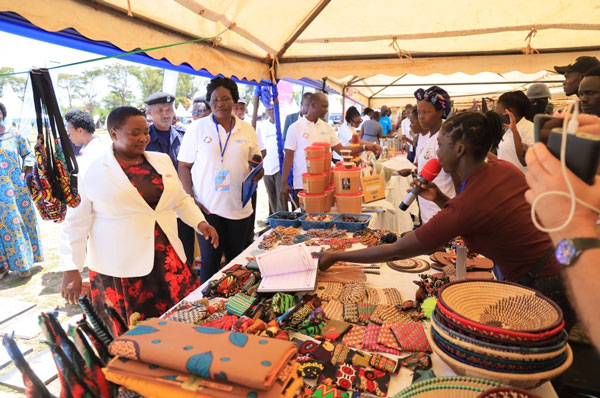
Gulu, Uganda | THE INDEPENDENT | The Parish Development Model (PDM), one of the government’s latest interventions to lift Ugandans at the grassroots to the money economy could help the country achieve the Sustainable Development Goals (SDGs) if well implemented, United Nations (UN) officials have revealed.
The government launched the implementation of the PDM in February last year and targets to benefit 16.1 million Ugandans, or 3.5 million households, living under a subsistence economy. Through the program, the government intends to disburse up to Shillings 100 million to each parish across the country, which will be used as a revolving fund by benefiting Saving and Credit Cooperative Organizations (Sacco) members.
Suzan Ngongi Namondo, the UN Resident Coordinator in Uganda on Tuesday lauded the government for the program and noted that if it is well implemented, it can have a massive ripple effect on the achievement of several SDGs. Speaking at the 78th-anniversary celebration of the UN Day held for the first time in Gulu City, Namondo says the UN is very committed to supporting the program that intends to lift 39 percent of Ugandans into the money economy. She says the initiative is a big boost for the country towards achieving the SDGs by 2030.
Namondo however revealed that with only seven years left for the implementation of the 17 SDGs, the world is losing track of its progress. According to her, only 15 percent of the SDGs have been achieved since 2015 owing to numerous global challenges such as the COVID-19 pandemic that decimated fiscal spaces, the crisis in Ukraine, and financial challenges in respective countries.
World leaders adopted the implementation of 17 SDGs in 2015 as a universal call to action to end poverty, protect the planet, and ensure that by 2030 all people enjoy peace and prosperity. The Sustainable Development Goals Report 2023: Special Edition released in July this year highlighted the existing gaps in the SDGs implementation and urged the world to redouble its efforts in achieving the targets.
Dmitry Pozhidaev, a United Nations Capital Development Fund (UNCDF) Country Representative says PDM is a productive way of addressing poverty issues in the country. He however says that the financing mechanism that is at the core of the program has to have enough technical assistance to mitigate risks of having the fund being wasted without promoting long-term sustainable productive activities.
Prime Minister Robinah Nabbanja, who was the chief guest at the national commemoration says the government recognizes the importance of grassroots engagement in localizing and popularizing the SDGS and notes that the PDM money should be used profitably.
She says this year’s commemoration in particular is important as it highlights the need to double efforts to accelerate the achievement of SDGs in the country seven years before its deadline.
According to Nabbanja, the government has made some strives to achieve some goals citing that currently, there is expanded access to health services, education, environmental justice, and promoted gender equality. She says the government is now implementing its third NDP (NDP III), which runs from the 17 SDGs and their targets fully integrated.
Pascal Byarugaba, the Program Monitoring and Evaluation Specialist at the SDG secretariat in the Office of the Prime Minister on Monday said the government has been able to make good progress from 41 SDG indicator points in 2016 to 135 SDG indicator points out of 201 applicable to the country.
In a bid to achieve the SDG by 2030, the Ugandan government recently came up with six core commitments that it will focus on to accelerate the implementation of the SDGs. The commitments include accelerating the leave no one behind agenda through the inclusive PDM implementation, accelerating inclusive actions for trade financing and climate-smart, and accelerating inclusive actions to leverage the advantages of science and technology.
Others are accelerating inclusive economic and social development through climate change adaptation and mitigation, accelerating Efforts to harness the full potential of data to improve the lives of all Ugandans, and accelerating the strengthening of SDG coordination and service delivery mechanisms.
***
URN
 The Independent Uganda: You get the Truth we Pay the Price
The Independent Uganda: You get the Truth we Pay the Price



